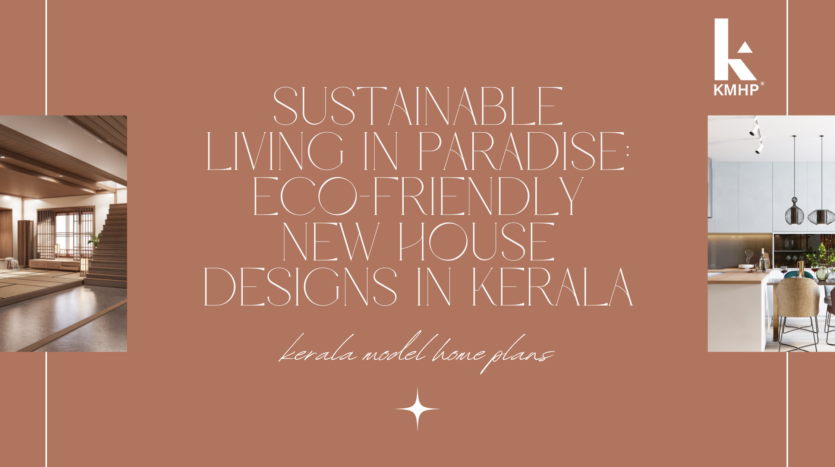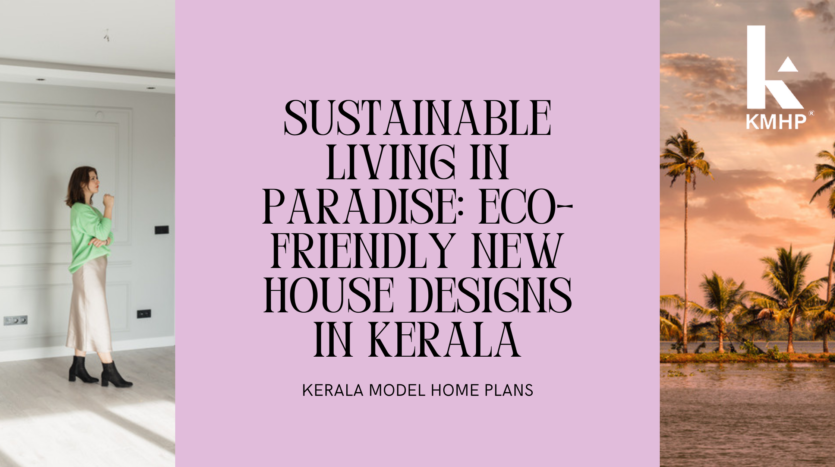Kerala, often referred to as “God’s Own Country,” is not only known for its picturesque landscapes and vibrant culture but also for its commitment to sustainable development. As the world grapples with environmental challenges, Kerala has emerged as a beacon of hope, embracing sustainable living practices to create a harmonious coexistence between humans and nature. In this article, we delve into the realm of eco-friendly new house designs in Kerala, exploring the principles, techniques, and benefits of sustainable living. From integrating traditional and modern architecture to employing renewable energy solutions, Kerala showcases how sustainable living can thrive in paradise.

Eco-Friendly House Design Principles
Passive Design Strategies for Natural Ventilation and Lighting
When it comes to designing eco-friendly houses in Kerala, passive design strategies take center stage. By maximizing natural ventilation and lighting, these homes reduce the need for artificial cooling and lighting systems, thus minimizing energy consumption. Large windows, well-placed openings, and architectural features that promote air circulation ensure a comfortable living space while reducing the carbon footprint.
Incorporating Green Spaces and Biophilic Design
One of the keys to sustainable living is connecting with nature, and what better way to do that than by incorporating green spaces within our homes? Kerala’s new house designs embrace biophilic design, which seeks to create a harmonious connection between humans and nature. From rooftop gardens to vertical plant walls, these homes bring the beauty and serenity of nature right to your doorstep.
2.3 Minimizing Environmental Impact through Efficient Space Planning
Efficient space planning is another crucial aspect of eco-friendly house designs in Kerala. By optimizing the use of space and minimizing wastage, these homes ensure that every square foot serves a purpose. Smart storage solutions, multipurpose furniture, and thoughtful layouts not only maximize functionality but also minimize the environmental impact of construction materials and energy usage.
Integrating Traditional and Modern Architecture in Kerala’s New Houses
Preservation of Vernacular Architectural Elements
Kerala’s architecture is steeped in rich traditions and cultural heritage. In sustainable house designs, there is a conscious effort to preserve and showcase these vernacular architectural elements. From sloping roofs to traditional carved woodwork, these designs pay homage to the state’s architectural legacy while embracing modern eco-friendly practices.
Fusion of Traditional and Contemporary Design Features
While preserving tradition is important, it doesn’t mean sacrificing contemporary aesthetics. Kerala’s new house designs seamlessly fuse the charm of traditional elements with modern design features. The result is a unique blend of old and new, creating homes that are not only eco-friendly but also visually stunning.
Sustainable Materials and Construction Techniques
Importance of Locally Sourced and Renewable Materials
Sustainable house designs in Kerala prioritize the use of locally sourced and renewable materials. By minimizing transportation emissions and supporting local economies, these homes reduce their carbon footprint. Traditional materials like teak wood, bamboo, and laterite stone are not only visually appealing but also eco-friendly choices that add a touch of authenticity to the design.
Low-Energy Building Techniques and Insulation
To minimize energy consumption, sustainable house designs incorporate low-energy building techniques and insulation. From using energy-efficient appliances to installing solar panels, these homes are designed to be energy-efficient. Insulation materials and techniques ensure optimal thermal comfort, reducing the need for excessive heating or cooling.
Construction Waste Reduction and Recycling
Sustainable living goes beyond the finished house – it starts with responsible construction practices. Kerala’s eco-friendly house designs aim to reduce construction waste and promote recycling. By using prefabricated elements, minimizing material wastage, and recycling construction debris, these houses minimize their environmental impact throughout the construction process. With its commitment to sustainable development and the fusion of traditional and modern design elements, Kerala’s new eco-friendly house designs offer a glimpse into a greener future. Embrace sustainable living in paradise and make a positive impact on both your lifestyle and the environment.
Energy Efficiency and Renewable Energy Solutions
Incorporating Energy-Efficient Appliances and Lighting
When it comes to sustainable living in paradise, energy efficiency is key. Incorporating energy-efficient appliances and lighting into your new house design in Kerala can make a significant difference in your energy consumption. Opt for appliances with high energy star ratings and LED lighting fixtures to reduce your energy usage and lower your electricity bills. Plus, these modern appliances and lights come in sleek designs that will give your home an extra touch of style.
Solar Power and Other Renewable Energy Sources
Kerala is blessed with abundant sunshine, and harnessing this natural resource is a smart choice for sustainable living. Installing solar panels on your roof can provide you with clean and renewable energy to power your home. Additionally, consider exploring other renewable energy sources such as wind turbines or hydropower systems, depending on the specific location and resources available to you.
Smart Home Technology for Energy Management
Embrace the wonders of smart home technology to optimize your energy management. Smart thermostats, for example, can learn your habits and adjust the temperature accordingly, maximizing your comfort and minimizing wasteful energy usage. You can also install motion-sensor lights to avoid leaving them on when no one is around. With the help of smart devices, you can easily monitor and control your energy consumption, giving you the power to make sustainable choices effortlessly.
Water Conservation and Management Strategies
Rainwater Harvesting Systems
Rainwater is a precious resource, especially in tropical regions like Kerala where rainfall is abundant. Implementing rainwater harvesting systems in your new house design is a sustainable way to manage water usage. By collecting and storing rainwater, you can use it for various purposes such as watering your garden, flushing toilets, or even for everyday household chores. Not only will this help reduce your reliance on the municipal water supply, but it will also contribute to water conservation efforts.
Greywater Recycling and Reuse
Why waste perfectly usable water? Greywater, which is water from sinks, showers, and laundry, can be recycled and reused for non-potable purposes. Installing a greywater recycling system allows you to divert this water from going down the drain and repurpose it for activities like irrigation or flushing toilets. It’s a simple yet effective way to make the most out of every drop of water and reduce overall water usage in your home.
Efficient Irrigation Techniques
Maintaining a lush garden in Kerala doesn’t have to be water-intensive. By incorporating efficient irrigation techniques, you can minimize water wastage while still keeping your plants happy. Drip irrigation, for example, delivers water directly to the roots, reducing evaporation and runoff. Additionally, grouping plants with similar water needs together can help optimize water distribution. These small adjustments can contribute to significant water savings and ensure your garden thrives sustainably.
Waste Management and Recycling Practices
Segregation and Composting of Organic Waste
Proper waste management is a crucial aspect of sustainable living. Start by segregating your waste into different categories such as organic waste, recyclables, and non-recyclables. Composting organic waste, like kitchen scraps and garden trimmings, turns it into nutrient-rich soil that can be used to nourish your gardens. Not only does this minimize waste sent to landfills, but it also provides you with a sustainable source of fertilizer.
Recycling and Upcycling Strategies
Reduce, reuse, recycle! Implement recycling strategies in your daily life to minimize waste and help protect the environment. Make sure to separate recyclable items such as plastics, paper, glass, and metal, and ensure they are sent to the appropriate recycling facilities. Additionally, explore the world of upcycling, where you turn old or unwanted items into something new and useful. Get creative and give a second life to items that would otherwise end up in the trash.
Reducing Single-Use Plastics
Plastics have become a worldwide environmental concern, and it’s time we take action. Embrace sustainable alternatives to single-use plastics in your daily life. Replace plastic water bottles with reusable ones, carry your own shopping bags, and choose products with minimal packaging. Additionally, support local businesses and initiatives that promote eco-friendly practices. Every small step towards reducing single-use plastics contributes to a cleaner and healthier planet.
Benefits and Challenges of Adopting Sustainable Living in Kerala
Environmental Benefits and Reduced Carbon Footprint
By embracing sustainable living in Kerala, you are making a positive impact on the environment and reducing your carbon footprint. From conserving water and energy to managing waste responsibly, each sustainable choice you make contributes to preserving Kerala’s natural beauty and biodiversity. By living sustainably, you become an advocate for a greener future.
Economic Advantages and Long-Term Cost Savings
Sustainable living not only benefits the environment but also brings economic advantages. Incorporating energy-efficient appliances, utilizing renewable energy sources, and implementing water conservation strategies can significantly reduce your utility bills in the long run. Additionally, sustainable practices such as composting and upcycling can save you money by reducing the need to purchase fertilizers or new items. Embrace sustainability and watch your savings grow.
8.3 Overcoming Cultural and Behavioral Challenges
Adopting sustainable practices may come with its own set of challenges, especially when it comes to cultural and behavioral changes. However, with awareness and education, it is possible to overcome these challenges. Engage in conversations with the community, share the benefits of sustainable living, and encourage others to join in. By promoting a culture of sustainability, you can create a ripple effect that inspires others to make a difference. Remember, sustainable living doesn’t mean sacrificing comfort or style—it’s about making conscious choices that lead to a better future for everyone.In conclusion, sustainable living in Kerala is not merely a trend but a way of life that harmonizes with the natural beauty and rich heritage of the region. By embracing eco-friendly house designs, utilizing sustainable materials and construction techniques, and adopting energy and water conservation strategies, Kerala is setting an example for sustainable living practices around the world. The benefits of these endeavors are manifold, ranging from reduced environmental impact to long-term cost savings. As Kerala continues to pave the way for sustainable living paradigms, it inspires individuals, communities, and nations to strive towards a greener, more responsible future.
- Bet on Android 1xbet App with Ease - July 4, 2025
- Программа Для Ставок а Спорт Скачать Приложение Клиент 1xbet Com - July 3, 2025
- 1xBet কি হারাম? মুসলিমদের জন্য গুরুত্বপূর্ণ নির্দেশনা - July 3, 2025


